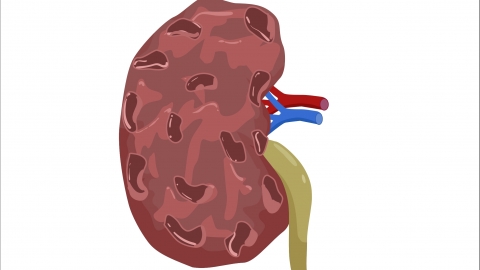What is Polycystic Ovary Syndrome (PCOS)?
Generally, polycystic uterus is clinically often referred to as polycystic ovary syndrome. The main causes of polycystic ovary syndrome include excessive mental stress, unhealthy lifestyle habits, insulin resistance, dysfunction of the hypothalamic-pituitary-ovarian axis, and abnormal adrenal function. If discomfort symptoms occur, it is recommended to seek timely treatment at a regular hospital. Detailed analysis is as follows:
1. Excessive Mental Stress
Long-term mental tension and anxiety can lead to sympathetic nerve excitement in the body, affecting hormonal secretion balance and promoting increased secretion of androgens, thereby interfering with the normal ovulation function of the ovaries and causing manifestations associated with polycystic uterus. Stress can be relieved in daily life through meditation, yoga, traveling, and maintaining emotional stability; ensure 7-8 hours of sleep daily and avoid staying up late to prevent worsening endocrine disorders.
2. Unhealthy Lifestyle Habits
Obesity caused by long-term high-calorie diet and lack of exercise, or frequent late nights, smoking, and alcohol consumption may disrupt the body's metabolic balance and hormonal stability, increasing the risk of developing a polycystic uterus. Adjust the diet structure by reducing intake of fried foods and sweets, and consuming more vegetables, whole grains, and high-quality protein; perform aerobic exercises such as brisk walking or jogging 3-5 times a week for more than 30 minutes each time; quit smoking, limit alcohol consumption, and maintain regular作息.

3. Insulin Resistance
When the body's cells become less sensitive to insulin, the pancreas needs to secrete more insulin to maintain stable blood glucose levels. Excess insulin stimulates the ovaries to secrete excessive androgens and inhibits follicular development and maturation, leading to a polycystic uterus. Under a doctor's guidance, medications such as metformin hydrochloride tablets, acarbose tablets, and pioglitazone metformin tablets can be used to improve insulin resistance, while controlling weight and reducing intake of high-sugar foods.
4. Dysfunction of the Hypothalamic-Pituitary-Ovarian Axis
Abnormal regulation of this axis can cause excessive secretion of luteinizing hormone, which stimulates ovarian stroma to secrete androgens, hindering normal follicular development and forming multiple small follicles that accumulate, resulting in a polycystic uterus. Under a doctor's guidance, medications such as drospirenone ethinylestradiol tablets, ethinylestradiol cyproterone tablets, and desogestrel ethinylestradiol tablets can be used to regulate hormone levels and restore ovulatory function.
5. Abnormal Adrenal Function
Adrenal hyperplasia or hyperfunction can cause excessive secretion of androgens such as dehydroepiandrosterone. These androgens enter the bloodstream and affect normal ovarian function, inducing a polycystic uterus. If adrenal hyperplasia is present, under a doctor's guidance, medications such as dexamethasone tablets, prednisone tablets, and hydrocortisone tablets can be used to suppress adrenal androgen secretion; when the condition is severe and drug treatment is ineffective, partial adrenalectomy can be considered.
In daily life, regularly monitor menstrual cycles, weight, and blood glucose changes; maintain external genital hygiene to prevent gynecological infections; follow medical advice for regular follow-up tests of hormone levels and ovarian ultrasound to adjust treatment plans timely.









